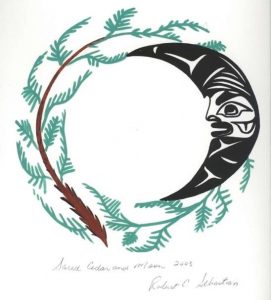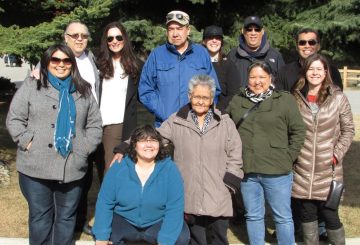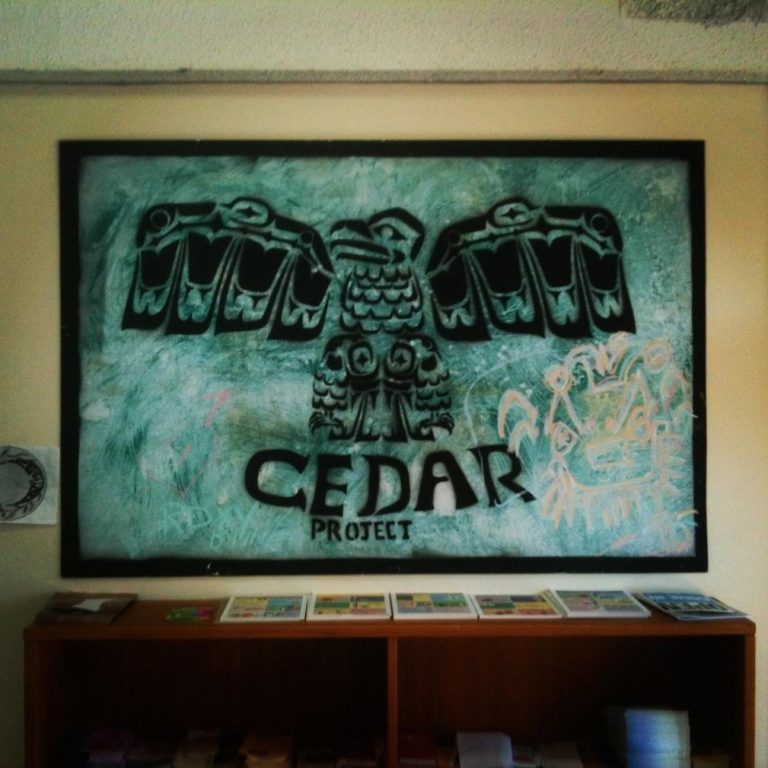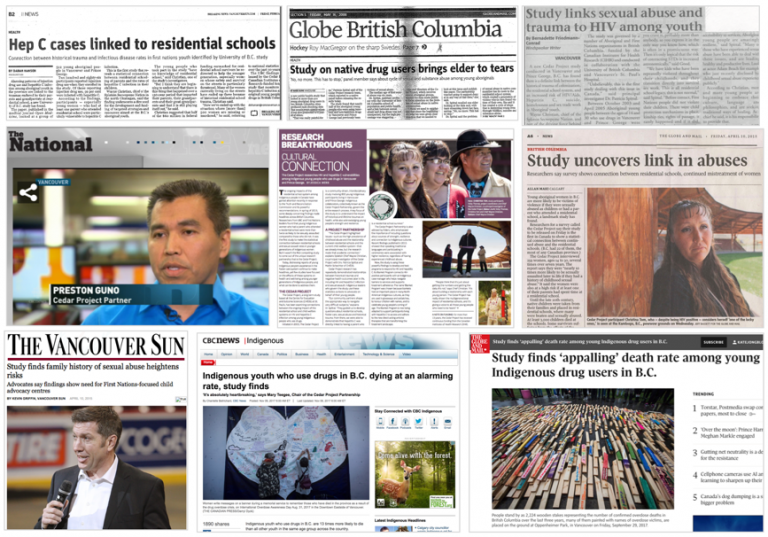 Since 2003, the Cedar Project study has examined connections between ongoing colonial impacts of residential schools and child welfare on HIV and hepatitis C among young Indigenous people who use drugs in British Columbia. It is a community-driven cohort involving 800 participants in Vancouver and Prince George, on the traditional territories of the Coast Salish and Lheidli T’enneh peoples.
Since 2003, the Cedar Project study has examined connections between ongoing colonial impacts of residential schools and child welfare on HIV and hepatitis C among young Indigenous people who use drugs in British Columbia. It is a community-driven cohort involving 800 participants in Vancouver and Prince George, on the traditional territories of the Coast Salish and Lheidli T’enneh peoples.
As Cedar participants represent many of the diverse Indigenous communities and nations across BC and Canada, the cedar tree – the tree of life – was identified as a powerful metaphor for healing and wellness and this meaning captures the goals of our study.
Being invited to prepare this blog for UBC’s Indigenous Research Support Initiative gave us a chance to reflect on our process, and share what has helped us continue for over 15 years.
Upholding relationships in the research process
Our study is governed by The Cedar Project Partnership, an independent body of Indigenous Elders, leaders, health/social service experts, and scholars. The Partnership provides protection, leadership, support, and ensures self-determining ethical principles and Indigenous knowledges are respected. It has been in place from the very beginning.
 Members of the Cedar Project Partnership are Elders Earl Henderson (Métis & Cree) and Violet Bozoki (Lheidli T’enneh), Vancouver Native Health Society, Red Road HIV/AIDS Network, Canadian Aboriginal AIDS Network, Carrier Sekani Family Services, Positive Living North, Prince George Friendship Centre, and All Nations Hope, as well as Splatsin, Neskonlith, and Adams Lake Indian Bands.
Members of the Cedar Project Partnership are Elders Earl Henderson (Métis & Cree) and Violet Bozoki (Lheidli T’enneh), Vancouver Native Health Society, Red Road HIV/AIDS Network, Canadian Aboriginal AIDS Network, Carrier Sekani Family Services, Positive Living North, Prince George Friendship Centre, and All Nations Hope, as well as Splatsin, Neskonlith, and Adams Lake Indian Bands.
Earl, one of the study Elders, reflects that Cedar’s strength is in the relationships between the participants, partners, Elders, staff, students, and academics:
“My take on why Cedar has been able to continue for so long is that it’s running culturally and traditionally. If there is an issue around a certain protocol, how to culturally handle something, then Violet or I provide a teaching, and help to sort it out. Cedar is committed to that process. Part of this is that we as Elders need to walk our talk. We have to lead by example, or else the youth we are working with won’t respect us.
Before any of the work happened, the staff established relationships with the participants. They got to know them. There’s a perspective in academia that doing that introduces bias, but really, if you know the person, you know the right questions to ask. Without the trust, there would be no research.
The other thing, too, is the relationship with the students. Violet and I mentor the students involved in Cedar to explain and help them understand what is culturally appropriate and why. Academics have to be humble and respectful – you can’t go in there like you know everything. The participants are the experts, you’re not. That’s why you’re there doing the research.”
Earl Henderson (Cree & Métis), Partnership Elder, Adjunct Professor at UNBC.
“The Partnership wraps us in their care and love to make sure that we can do this work in a good way. They are there to hold us true to Indigenous accountability.
At the heart of Cedar is the participants. The frontline staff are caring and walking with the participants. We are holding them up by recording their stories and wrapping them in a blanket of care. It’s a safe way for our participants to tell their truths without having to out themselves. It is a safe way for them to effect change while they are still not ready to heal.”
Vicky Thomas (Wuikinuxv Nation), Cedar Project Coordinator
Cultural safety at Cedar study offices
A critical component of Cedar is to ensure that our site offices are safe, welcoming settings without judgment of drug use, where police are not allowed, and cultural identity is honoured. Overall, our paradigm is to acknowledge grief and historical trauma, while building on young Indigenous peoples’ strengths.
“To make Cedar a culturally safe place for participants, I go on the teachings of my mom, my aunties, and other influential women in my life. You have to think of the office as a home, and think about what would you do to welcome someone into your home. We do things like have food, and its ok for people to sleep away a shift on the couch, take a sponge bath in the bathroom, or make calls to family.”
Vicky Thomas (Wuikinuxv Nation), Cedar Project Coordinator
Our Partners often provide access to traditional foods, medicines, and ceremonies for Cedar participants, such as through annual feasts and memorials.
“Food has always been central to everyone’s cultures, no matter where they are. A meal automatically pulls people together. There’s kind of an expectation that if you’re feeding one another, you’re doing good things for each other.
Ceremony is also important, including in research. There’s a process of trying to reintroduce of what’s been either lost, or perhaps temporarily forgotten, especially for those who might have been disconnected from their roots. In trying to fill the void that was left by the impacts of colonization, the idea, in my mind, is trying to get back as close as we can to our cultures, to some of the best parts, without overdoing it. What it boils down to is that our cultures represent the values of our folks. That underpins everything.”
Lou Demerais (Cree & Métis), Executive Director of Vancouver Native Health Society
Providing evidence related to crises of sexual abuse, child welfare, and HIV / Hepatitis C
Our findings affirm what Indigenous communities know – that intergenerational trauma exacerbates risk for HIV, illness, and death. Cedar demonstrated direct links between having a parent who attended residential school, child welfare experiences, and sexual abuse with concerning health outcomes including HIV and hepatitis C, sexual assault, and suicide. Recently, we released findings demonstrating that young Indigenous people who use drugs in BC are dying at a rate nearly 13 times Canadians their age, and identified concerning associations between death and hepatitis C infection, having previously attempted suicide, and recent non-fatal overdose. Indigenous leaders use this evidence to advocate for their young people.
“What’s really important to remember is that these are not just numbers. These are our relations, our brothers and sisters, sons and daughters, aunties and uncles, cousins. Cedar’s work has affirmed what we know to be true, that the residential school and child welfare system, and traumas of sexual abuse, continue to impact our young people.
We have to start doing intervention at a younger age as a lot of that can be interrupted if we design the proper types of programs, that are rooted in our laws and ways of doing things, and that are trauma-informed.”
Kukpi7 Wayne Christian, (Splatsin te Secwepemc), Co-Principal Investigator of the Cedar Project and Cedar Project Partner, Chief of Splatsin First Nation and Tribal Chief of Shuswap Nation Tribal Council
Importance of strengths-based research
The Partnership emphasized the importance of researching sources of strength, resilience, and connection to Indigenous cultures. Study Elders Earl and Violet developed questions related to cultural connection, including language, ceremony, traditional food, and living by traditional culture that are asked at every six-month follow up visit. Together with a resilience scale, we were able to affirm statistical links between what Indigenous people have known for centuries, that speaking traditional languages and participating in ceremonies was associated higher resilience, regardless of abuse experiences.
“So much of what is written about Indigenous people comes from a very deficit model…you read anything about us, and we’re always the ‘highest’ whether that’s HIV, HCV, diabetes, arthritis, or cancer. It’s really important for me that we look at all the other strengths, especially with our participants. We really need to focus on these strengths, the way participants have been able to survive themselves.”
Sherri Pooyak (Cree), Partnership member, Community-based research manager, Aboriginal HIV & AIDS Community-Based Research Collaborative Centre
“Having the cultural questions allows us to look at resilience and strength not just in a Western way, but in an Indigenous way. We know that our wellness and social determinants of health come from our identities, our families, our cultures, our languages, and our land. So, having these questions is just as – if not more – important than asking about resilience from a more Western perspective.”
Vicky Thomas (Wuikinuxv Nation), Cedar Project Coordinator
Integrating ceremony and Indigenous-led media relations in knowledge translation
Ceremony is an important part of Cedar’s knowledge translation process. For example, in 2013 we received CIHR-funding to hold a Learning Potlatch on Lheidli T’enneh territory. Study Elder, Violet Bozoki, guided us in the protocols of our Cedar potlatch as it was held on her territory. We hosted over 200 attendees, including Cedar staff and partners, participants and their families, and community members. It was an opportunity for Cedar participants, many of whom have experienced family disconnections through child welfare and having parents who attended residential school, to participate in culture and ceremony. We honoured our partners and participants with gifts, including blankets and dry goods.
As well, it was a good way to have a community discussion about the issue of sexual abuse. When we first started Cedar, half of participants reported they had experienced childhood sexual abuse. One participant shared Cedar’s findings in her own words, and another participant shared her personal story. Sheldon Kennedy, a child abuse survivor, advocate, and former NHL hockey player attended the full-day event and spoke about his experiences.
“Our people don’t end up on the street, don’t end up in addiction, unless there’s quite a bit of trauma in their background. Knowing that that was the bulk of the information we were going to be sharing, it was important to bring our sexual abuse findings back to our participants, their families, and their communities in a safe way. In a way that would honour them, that wouldn’t place blame or shame, that celebrated their truth – and the best way to do that is through ceremony.”
Vicky Thomas (Wuikinuxv Nation), Cedar Project Coordinator
Another aspect of our knowledge translation process is that the Partnership determines release of findings to the media, emphasizing community relevance, reciprocal responsibility, and privileging Indigenous voices.
Decolonizing research training for graduate students
Training graduate students to become ethical, culturally safe and humble researchers is essential to Cedar. Student trainees are partnered with an Indigenous mentor who works with them from study design through to interpretation and presentation of results. This ensures reciprocal responsibility, as students receive one-on-one guidance/cultural wisdom, and the student’s contributions are relevant.
“I think with mentoring students, it is more than just sharing what you know in an academic sense about methodologies or that kind of thing. It’s more about supporting students to begin to get a sense of another worldview. It’s about coming to understanding of what we mean when we talk about relationship…an integrated worldview that includes how we understand the land, how we understand our environment, how we understand and interact with the spirits, how we interact with ceremony. I see my role as trying to help students learn about this so that when participants share their stories, I can give context and help interpret through this lens, and say, ‘you might want to frame it this way’.
The other part of mentoring that I didn’t expect is being a counsellor or confidant or Auntie – providing emotional support and guidance as students bear witness to very difficult stories related to participants’ traumatic experiences. I don’t think this is usually part of Western mentoring relationships. We care about the students, and so we want to see them be well, whether that’s them sharing their struggles or successes. We have a role to help students through that.”
Sherri Pooyak (Cree), Partnership member, Community-based research manager, Aboriginal HIV & AIDS Community-Based Research Collaborative Centre
Embarking on intervention research rooted in Indigenous knowledges and values
 Cedar findings have laid foundation to develop and test programs responding to HIV / Hepatitis C and contributing to wellness. Our Blanket Program connects HIV+ participants with case managers who navigate barriers to services and adherence. We chose the name as blankets are important in many Indigenous cultures in BC, used for potlatches, naming, and coming of age. The Blanket Program is now being adapted to support participants with hepatitis C access and adhere to new therapies.
Cedar findings have laid foundation to develop and test programs responding to HIV / Hepatitis C and contributing to wellness. Our Blanket Program connects HIV+ participants with case managers who navigate barriers to services and adherence. We chose the name as blankets are important in many Indigenous cultures in BC, used for potlatches, naming, and coming of age. The Blanket Program is now being adapted to support participants with hepatitis C access and adhere to new therapies.
Thank you for the opportunity to share some of our reflections on our process.
The Cedar Project Partnership and the Cedar team


